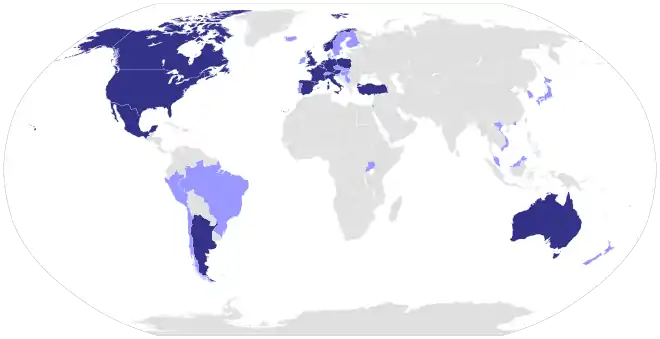QuidditchUK
QuidditchUK is the official governing body of quidditch in the United Kingdom and is affiliated with the International Quidditch Association. It began in 2011 as a Facebook group intended to act as a network for quidditch teams and players within the UK to communicate with each other, become aware of local teams and resources,[1] and set up matches and new teams.
 | |
| Abbreviation | QUK |
|---|---|
| Formation | 2011 |
| Legal status | Non-Profit Organisation |
| Location | |
President | Matt Bateman |
Vice-President | Abby Whiteley |
| Website | www |
History and internal structure
Since its foundation, QuidditchUK has become vastly developing organisation as, after hosting the Summer Games[2] in August 2012, there was a massive growth of quidditch teams throughout the country. It was at this point that QuidditchUK advanced from a network for UK teams and players, to become an established governing body of quidditch in the UK.[3]
A staffing structure was set up whose aim would be to develop and promote quidditch in the United Kingdom. Its current president is Matt Bateman, and the Vice President is Abby Whiteley.[4]
The staff of QUK is currently composed of volunteers within the quidditch community.[3]
Events
Previous competitive structure
The first British Quidditch Cup (BQC) was held on 9–10 November 2013, at University Parks in Oxford, England[5] with 16 teams competing.[3] The host team, Oxford's Radcliffe Chimeras, won the trophy, beating Avada Keeledavra[6] in the final with Bangor's Broken Broomsticks placing third. The second BQC[7] was held at Wollaton Hall and Deer Park, Nottingham on 7–8 March 2015 and was won by Southampton Quidditch Club 1.[7]
QuidditchUK operated a "Challenge Shield" league event which ran 2014–2015. This competitive format was phased out in 2015 in favour of two regional competitions.[8]
Current competitive events and structure
Currently QUK run 4 major tournaments Northern and Southern Cups, British Quidditch Cup and most recently the Development Cup. At the beginning of the Session there are 2 regional tournaments, Northern and Southern Cups. each regional tournament is open to any team that applies to play. The tournaments are run over 2 days. On the first day, teams are split into groups of 4 where they compete in a round robin. Day 2 consists of 2 separate knockout tournaments, the top 2 teams from each group compete in "the champions bracket" while the rest play in "the consolation bracket". Regionals are used to qualify teams for both EQC and British Quidditch Cup alongside seeding teams for BQC. EQC spots are distributed equally between the two regions whereas British Quidditch Cup spots are distributed proportionately to the number of teams competing in the region. Currently the Velociraptors are the northern cup champions and Warwick QC is the southern cup champions.
At the end the season the top 32 teams, as decided by regionals, compete in the British Quidditch Cup. On day one of the tournament the teams are split into 8 groups of 4 where they compete in a round robin. Day 2 follows at the same "champions bracket"/ "consolation bracket" knockout structure seen in Northern and Southern Cups . BQC's final standings are used to rank all teams in attendance alongside seeding next season's regionals. The current champions are "the Velociraptors" with past champions including "Oxford Radcliffe Chimeras" and "Bangor Broken Broomsticks".
The Development Cup was first introduced to the Quidditch community in 2017. The Development Cup is the most recent addition to QUKs line up of official tournaments. Development Cup allows any team that did not qualify for BQC to compete. Its main aim is to allow teams with little competitive experience the opportunity to play other teams of a similar level competitively. The first Development Cup encouraged experienced coaches to coach an attending team for the weekend in order to help them develop as a team. The first Development cup was won by Liverpool's "Liverpuddly Cannons"
Future aims
By the 2017–18 season QuidditchUK aim to have six official tournaments [9]
QUK aim to increase the number and quality of its officials (referee, time keeping, snitching and scorekeeping). From discussions with the International Referee Development Programme the aim is for all officials to be certified. To assist with this mock tests and additional resources as well as the standardized training packages and snitch training academies that the organisation offers every season.[3] By 2018 they predict to have all member clubs providing a fully qualified referee team to expand the number of officials and assist with running of tournaments.[3] QUK aims to be recognised by Sports England by 2020. The organisation will potentially explore BUCS recognition.[3]
Teams
These are the teams involved with UK Quidditch listed as they appear in QuidditchUK's team directory:[10]
Currently actively competing Quidditch clubs:
- Bangor Broken Broomsticks
- Bath Quidditch Club
- Bournemouth Banshees Quidditch Club
- Bristol Quidditch Club
- Cambridge University Quidditch Club
- Chester Centurions
- Derby Daemons
- Durham University Quidditch Club
- Exeter Eagles
- Canterbury Flying Chaucers
- Glasgow Grim Reapers
- York Horntails Quidditch Club
- Holyrood Hippogriffs
- Keele University Quidditch Club
- Kent Quidditch Club
- Leeds Griffins Quidditch Team
- Leicester Thestrals
- Liverpuddly Cannons
- Loughborough Longshots
- London Quidditch Club
- London Unspeakables
- Manchester Universities Quidditch Club
- Northumbria Quidditch Club
- Northern Lights Quidditch Club
- Norwich Nifflers
- Nottingham Nightmares
- Oxford University Quidditch Club
- Sheffield Quidditch Club
- Southampton Quidditch Club
- Southsea Quidditch
- St Andrews Snidgets
- Stirling University Dumyat Dragons Quidditch
- Swansea Swans
- Tremough Quidditch Club (Falmouth)
- UCLAN Quidditch Club (Preston)
- Velociraptors Quidditch Club
- Warwick Quidditch Club
- Werewolves of London
European competition
The first international club level fixture took place in Brussels, February 2014 when both Oxford University teams were invited to play in the European Quidditch Cup (then known as the European Regional Championships), Oxford's first team "the Radcliffe Chimeras" came 1st. in the following years, more teams where invited to the European Quidditch cup. In 2015 the UK hosted EQC, originally the UK were supposed to send 6 teams but due to dropouts 10 teams were sent to replace those missing. In 2016 the UK sent 8 teams to Italy, 7 out of 8 came finished in the upper bracket while the other team didn't lose a match on day 2. 2017 saw 6 teams compete in Belgium. 2018 saw 4 teams compete Germany.
2016 onwards saw teams compete for EQC spots, halve the spots were given to the top teams in the north, the other half were given to the top teams in the south.
The 2018/2019 Season onwards saw top-teams from the South and North compete for 12 spots in a special European Qualifier Tournament (EQT) held in London. This tournament was used to determine the top eight teams qualifying for EQC spots.
National team
QuidditchUK also plays hosts to Team UK[11] which represents the UK in international quidditch tournaments. The team made its debut in 2012 at the Summer Games in Oxford where it placed 5th of five teams. Team UK travelled to Burnaby, Canada for the 2014 Global Games to compete and ranked 4th. In 2015 Team UK competed in the inaugural European Games held in Sarteano, Italy placing second behind France, after a close final that ended 90*–50. In July 2016, Team UK[12] competed in the World Cup, formerly known as the Global Games, in the host city of Frankfurt, Germany.[13]
Below is a table of all Team UK's major fixtures.[12]
| Year | Host nation | Placed | Number of teams |
|---|---|---|---|
| 2012 | Oxford, UK | 5th | 5 |
| 2014 | Burnaby, Canada | 4th | 7 |
| 2015 | Sarteano, Italy | 2nd | 12 |
| 2016 | Frankfurt, Germany | 3rd | 21 |
| 2017 | Oslo, Norway | 1st | 15 |
| 2018 | Florence, Italy | 4th | 29 |
See also
 United Kingdom portal
United Kingdom portal
References
- "Hooch Iniative QuidditchUK" (PDF). quidditchuk.org. 2015. Archived from the original (PDF) on 14 August 2016. Retrieved 28 April 2016.
- "British Quidditch Cup History". quidditchuk.org. Archived from the original on 3 April 2016. Retrieved 28 April 2016.
- "QuidditchUK Strategic Plan 2015- 2018" (PDF). quidditchuk.org/files/QuidditchUK_Strategic_Plan. Archived from the original (PDF) on 23 September 2016.
- "QuidditchUK - About". quidditchuk.org. Archived from the original on 3 April 2016. Retrieved 28 April 2016.
- "BBC News - First 'Quidditch' British Cup held in Oxford". BBC Online. Retrieved 25 November 2013.
In total 26 matches for the inaugural national tournament took place in the University Parks grounds. Chairman of Quidditch UK Ben Morton said this was "the biggest Quidditch tournament outside America".
- "Oxford Quidditch Club". www.ouqc.uk. Retrieved 28 April 2016.
- "BQC 2014-15 Overall Result" (PDF). QuidditchUK. Archived from the original (PDF) on 14 August 2016. Retrieved 28 April 2016.
- "QuidditchUK - Calendar". quidditchuk.org. Archived from the original on 27 March 2016. Retrieved 23 May 2016.
- "QuidditchUK Strategic Plan 2015- 2018" (PDF). quidditchuk.org/files/QuidditchUK_Strategic_Plan. Archived from the original (PDF) on 23 September 2016.
- "QuidditchUK - Clubs". quidditchuk.org. Archived from the original on 3 April 2016. Retrieved 28 April 2016.
- "QuidditchUK - TeamUK". quidditchuk.org. Retrieved 3 May 2016.
- "QuidditchUK - TeamUK". quidditchuk.org. Retrieved 28 April 2016.
- "International Quidditch Association". www.iqaquidditch.org. Archived from the original on 19 April 2016. Retrieved 28 April 2016.

